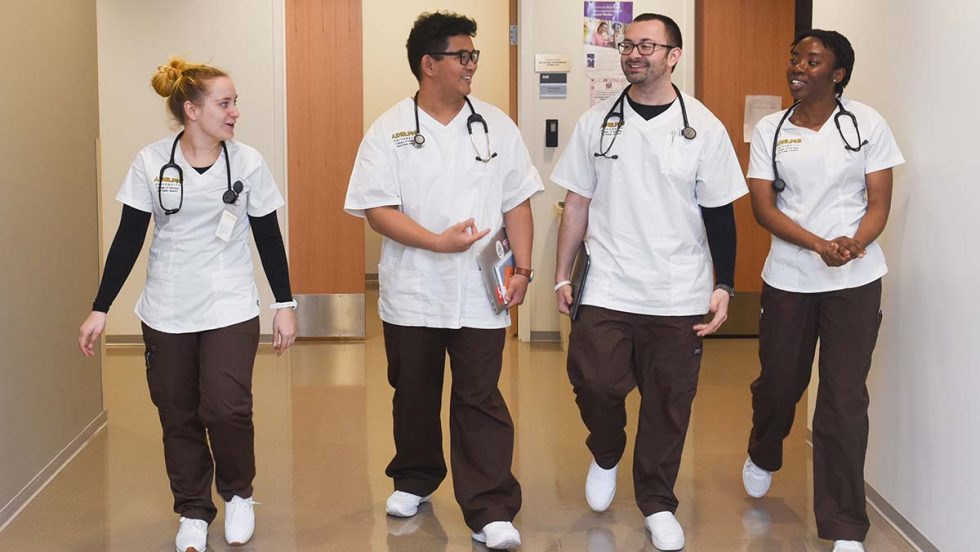
With a growing number of male nursing students, an inspiring group of male nursing faculty, a trustee who earned his nursing degree at Adelphi and a dedicated support group for male nurses, Adelphi is providing an innovative answer to America’s nursing shortage.
The United States is facing a nursing crisis. The number of registered nurses is projected to decline by 1.5 million by 2030, due to factors such as retirement, burnout and a lack of new nurses entering the profession.
Can this crisis be averted by attracting more men to the profession?
Anthony Egan, director of the College of Nursing and Public Health’s Clinical Education and Simulation Lab, thinks it’s possible—and he is actively working to bring more men into the field and provide greater support for the men who make up about 13 percent of Adelphi’s nursing students. This spring, he established a chapter of The American Association for Men in Nursing (AAMN) at the University. The chapter has already attracted 15 members.
Egan’s work is a reflection of Adelphi’s history of leadership in nursing education as well as its commitment to diversity. Founded in 1943 as the first school of nursing on Long Island, the College is ranked as a Best BSN Program and Best Grad School for Nursing by U.S. News & World Report and is one of only seven current nursing programs in the nation recognized by the National League for Nursing for advancing the science of nursing education. The nursing program is highly diverse, with 55 percent of undergraduates and 59 percent of graduate students identifying as non-white; 34 percent are Pell Grant recipients.
Male Nursing Students Need Support
When Egan began his nursing career in 1995, he was something of a rarity in a profession traditionally considered “women’s work.”
“There’s still a stigma about being a man in nursing that can lead to self-doubt,” Egan said, noting that male students nationwide are more likely to drop out of nursing programs than female students. Providing male role models for male nursing students will improve the retention rate, he said. “Once male students see there are men in nursing and that they’ve succeeded, it encourages them.”
One of the Adelphi chapter’s first actions was to photograph four nursing students who are on the University’s men’s lacrosse team and post their images on the Adelphi athletics website and on social media.
“I want to become a nurse because I believe your health is truly the most important priority,” reads the text next to an image of Adelphi lacrosse player and nursing major Brian Harinski wearing his Panthers jersey and a stethoscope.
Adelphi’s AAMN chapter is bringing two male RNs to campus in the fall to speak to nursing students about their experiences in the profession. “We’re bringing in a male nurse who’s in the Navy and a male nurse who works for Northwell on its helicopters,” Egan says. They also plan to have a barbecue to welcome nursing students back to campus and a celebration for the men graduating from the nursing program in December.
“Our goal is to support our male students and give them a place to voice any concerns or issues they’re having,” Egan said. “Eventually we’ll recruit freshmen into the nursing program, but baby steps first.”
Egan is one of a number of men on Adelphi’s nursing faculty who serve as role models for students, including Professor Edmund J.Y. Pajarillo, PhD; Associate Professor William Jacobowitz, EdD; Assistant Professor Edwin-Nikko R. Kabigting, PhD; Clinical Assistant Professors Daniel McWeeney, DNP, and Charles Cal ‘01, MBA ‘03; and Coordinator of Instruction Michael Boccia, an RN.
Men in the nursing program can also look up to an Adelphi nursing alumnus who sits on the University’s board of trustees—Leonard C. Achan ’99, president and CEO of LiveOnNY, a federally designated New York state nonprofit organ procurement organization.
“Being a nurse can lead to endless career paths in the healthcare and business ecosystems,” Achan said. “Nurses are needed in every growing sector of the economy, which my nursing education at Adelphi prepared me for. Adelphi also prepared me to pursue leadership roles beyond the clinical setting and merge it with my business and entrepreneurial interests.”
More Men Are Becoming Nurses
Men’s representation in nursing has grown steadily since the 1970s, when just 2.7 percent of registered nurses were men. By 2022, nearly 12 percent of registered nurses were men, an increase of nearly 400 percent.
Recruiting men to the profession is a great way to address the shortage, Egan said. “We need to expand where we’re looking for nurses,” he explained. “Attracting men to nursing is one way to fill the staff shortages, but we also need to recruit people of different ethnic backgrounds so we can better serve patients.”
The College of Nursing and Public Health also helps men who are RNs advance their careers as nurse practitioners and educators, offering a range of master’s degrees as well as doctorates in nursing and nursing practice.
No Lack of Compassion
Egan has witnessed the world becoming more open to men in nursing. “There’s a lot more acceptance for men as nurses now than when I started,” he said. “Back then, a lot of people didn’t think a man could do the job of a nurse. They thought men lacked the compassion and empathy necessary to care for a sick person.”
Egan tells of a male nurse who graduated from Adelphi and spent the COVID-19 pandemic at the bedsides of patients whose families couldn’t come see them in the hospital due to quarantine. “He brought in his iPad so his patients could FaceTime with their families,” Egan said. “He didn’t want them to die alone or be alone, so he sat there with them and helped them contact the people who loved them.”
It’s a commitment to compassionate care that the College of Nursing and Public Health instills in all of its students—women and men.